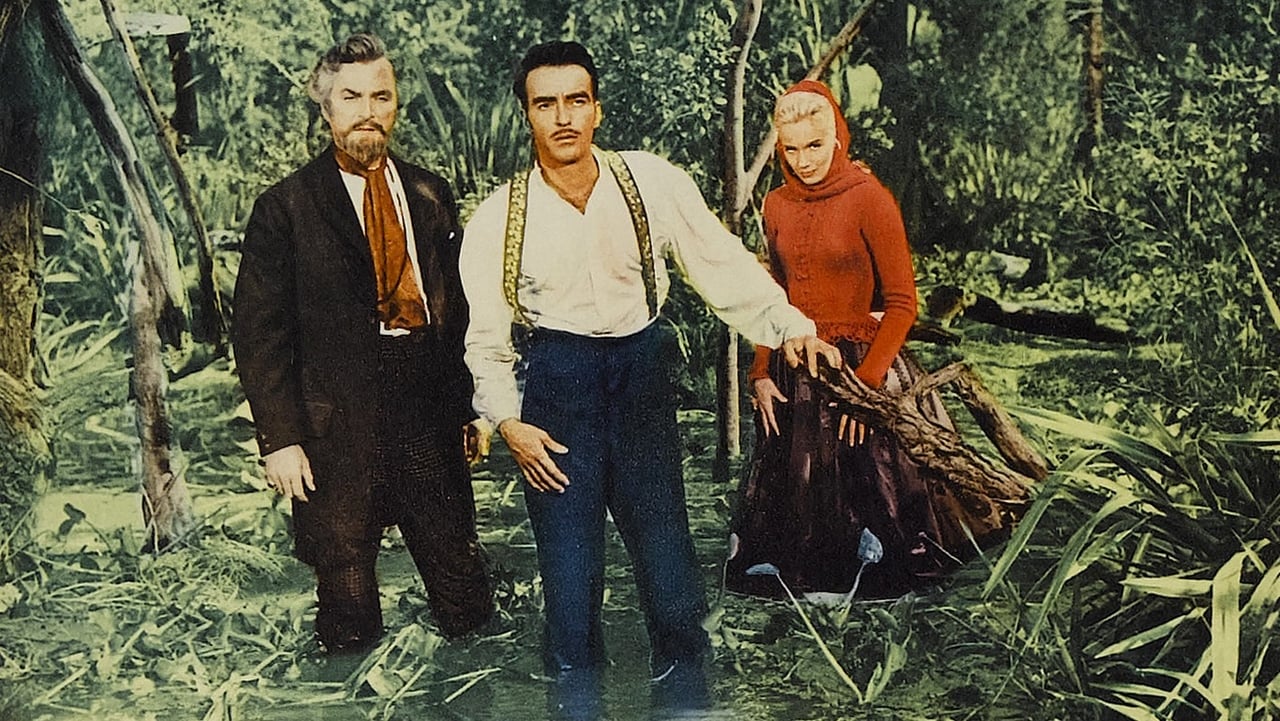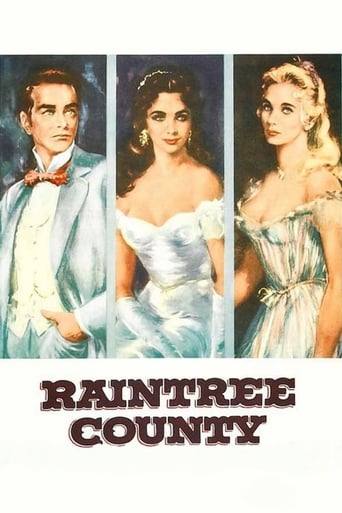

People are voting emotionally.
... View MoreInstant Favorite.
... View Moregood back-story, and good acting
... View MoreAbsolutely Fantastic
... View MoreMany people have savaged this film over the years, but like 'Cat on a Hot Tin Roof' I have to watch 'Raintree County' every time it is on TCM.Considering the tragic accident that happened to Cliff during the filming, I am always in wonder that director Edward Dmytryk was able to make a film that holds together so well. The acting, cinematography and the writing are excellent. Even in the scenes where you can tell Cliff is in pain, his acting is great. Taylor, as always, is her excellent self.True, the film is long, but don't let that scare you. This film is worth the time to sit down and watch.
... View MorePlot-- Before the Civil War, a pair of lovers marry and move from the North to the South where John finds out that new wife Susanna is haunted by a childhood trauma. Returning North they get caught up in the War, while Susanna becomes dysfunctional. What will John do, especially when lovelorn Neil (Saint) is still available.Oh my, I guess MGM had too big an investment not to release this swollen turkey. As I recall, it got a lot of hyped promotion in '57. For fans, like me, of the Taylor-Clift romantic pairing (A Place In The Sun, {1951}), this misguided sequel should be avoided like the plague. Taylor does her best in a part disjointed badly by a perforated script, while Clift struggles manfully following his traumatic road accident. Also undercutting the romantic theme is the absence of close-ups emphasizing the vital tender emotions. I suspect that was because of Clift's mid-filming disfigurement. Nonetheless, the first 2-hours of personal relationship is further pulled down by impersonal staging. And since so much of the film follows the romance, recovery is near impossible.The movie does come alive when Lee Marvin's blustery rough-neck comes on-screen. Clearly, he's on his way up the Hollywood ladder. But pity poor Eva Marie Saint of On The Waterfront (1954) whose sterling acting chops are almost totally wasted as the lonely heart in waiting. Where the movie does shine, as others point out, is in the visuals of costuming and massed army men. In short, the sort of production features big-budget MGM typically excelled at. I also like the effort at using the Raintree symbolism to bind the film into a poetic whole. Too bad, the script muddies that with sporadic development.Anyway, it's regrettable that such a prestige production got undercut by factors not entirely under studio control. I suspect there's a practical moral at work here, but I'm not sure what it is.
... View MoreThe story opens in 1859, in rural Indiana, as John and Nell (Montgomery Clift, Eva Marie Saint) are graduating from school. Though they've been in love for years, John is bewitched by the beautiful newcomer, Susanna (Elizabeth Taylor), a high-strung and unstable young woman.This 1957 film is an obvious attempt to match the grandeur of "Gone With the Wind" and it fails miserably. It's poorly written; by trying to include battle scenes, romance, mental illness, slavery, and good ol' country life, it lacks focus and purpose. Taylor shrieks and wails in her faux-Southern drawl and generally overacts the whole time, although she does wear some spectacular gowns. Saint and Clift are a boring couple and I didn't care about them at all. Rod Taylor and Lee Marvin steal the show - what there is of it - with bravura performances. Bad movie.
... View MoreI wasn't quite of age when this film was made and came out. I only saw it on television many, many years later. Its contemporary blockbuster "Ben-Hur", however (filmed in the same insanely spectacular Camera 65 process), did make it across the border to Canada and became compulsory viewing for all good little Catholic boys in my native Quebec. As this latter film was a remake of a past MGM glory, so was "Raintree County" supposed to rival "Gone With the Wind" in splendour and publicity. Although this hooplah never made it across the border into Canada either, I suppose it did have an effect on the American Public in those pre-video days when the chance of seeing GWTW again in all its Technicolor glory seemed slim to none. If you happened to be American and a little older than myself and a teenager in 1957, you would have known that Elizabeth Taylor was the flesh-blood-and-celluloid embodiment of the Veronica character in the Archie comics and the most desirable teen idol who ever graced a magazine cover. A rumoured romance with Montgomery Clift and her recent widowhood didn't hinder her status as queen of the teen tabloids. As a three hour period "Peyton Place"-like melodrama, the film was sure to be a hit with romantic US adolescents of both sexes and I think it is remembered fondly for that reason, despite its commercial flop. Its theme of miscegenation made it contemporary in a kind of daring pre-Civil Right Movement way and its unromantic, if not downright cynical view of the war made it a "serious" film. The thing that struck me the most about the reputation of that film is that when I became an avid collector of soundtracks on vinyl in the 80's I found out - to my utter befuddlement - that in collectors' cicles its legendary double stereo LP OST album of a very atypical score (by Johnny Green) was the most sought-after item in the history of the medium. (It is now finally available on CD, although, amazingly, the film itself is still not on Region 1 DVD.) In those days before video became the force that it is in making movies known and available to the largest audience, soundtrack albums were the best (and sometimes only) way fans could actually connect with the magic of reliving experiences tied to a beloved film that one didn't expect to ever see again except in souvenir-program format. And the fact that a relatively "un-Golden era" but perfectly original and competent composer like Johnny Green could attract that kind of attention is an apt measure of the love and fond remembrances that a lot of early baby-boomers felt for this movie, despite all its other faults and qualities.P.S.: The well-known factoid that the novelist's name was misspelled in the opening credits of the film is indicative of two things: (1) that the literay origins of the film didn't count for much in the attendant hype surrounding its production and (2) that big studios like MGM were starting to creak at the seams and to overextend themselves with such gigantic projects that couldn't possibly be held together in a rational manner. Distant echos of the future "Cleopatra" fiasco...
... View More